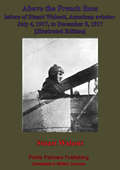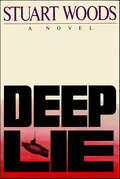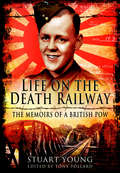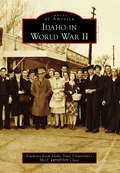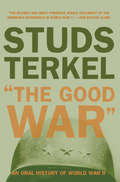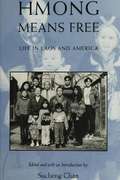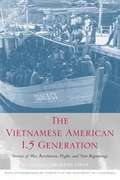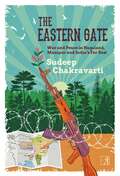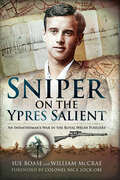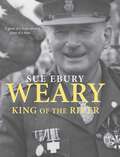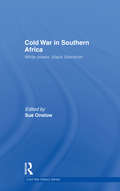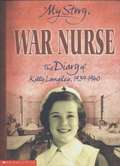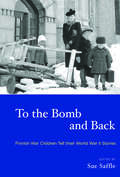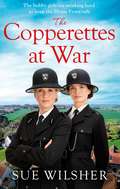- Table View
- List View
Above The French Lines; Letters Of Stuart Walcott, American Aviator.: July 4, 1917, to December 8, 1917 [Illustrated Edition]
by Stuart Walcott"It is now seven weeks since the dispatches from Paris reported that Stuart Walcott was attacked by three German airplanes and brought down behind the German lines, after he himself had brought down a German plane in his first combat on December 12, 1917, and that it was feared he had been killed; but even now, after the lapse of nearly two months, it is not definitely known whether his fall proved fatal, or whether the earnest hope of his friends that he is still alive may be realized."Unfortunately for the family and friends of Stuart Walcott, his grave was located not long after the Princeton Alumni Journal printed the above. He had given his life for his ideals of Democracy and Freedom fighting above the fields of France as a pilot. His letters recount his experiences training and fighting with the famed Lafayette Escadrille with fellow Americans.Author -- Walcott, Stuart, 1896-1917.Text taken, whole and complete, from the edition published in Princeton, Princeton university press; 1918. Original Page Count - 93 pagesIllustration -- 3 illustrations.
Deep Lie: A Novel (Will Lee Novels #3)
by Stuart WoodsUndersea espionage meets heart-stopping suspense in this action-packed thriller in the Will Lee series featuring Kate Rule—from #1 New York Times bestselling author Stuart Woods.Sifting through reams of seemingly unrelated intelligence, CIA analyst Kate Rule discovers a chilling pattern: an ultrasecret Baltic submarine base...a crafty Russian spy-master in command...a carefully planned invasion about to be launched from dark waters.Her suspicions, however, are dismissed by those higher up; her theory, they say, is too crazy to be true. But to Kate, it's just crazy enough to succeed—unless she can stop it. If she's right, an attack sub has already penetrated friendly waters. Worse yet, the enemy has penetrated deep into her own life, so deep she can touch him. And in this game, one wrong touch can mean Armageddon.
Life on the Death Railway: The Memoirs of a British POW
by Stuart YoungAs a young man Stuart Young endured the horrors of the Japanese prisoner-of-war camps and survived. Later in life, in graphic detail, he recorded the experience the dreadful conditions, the brutal treatment, the sickness and starvation, the merciless routine of forced labour. Yet he also recorded the comradeship among the prisoners, their compassion and strength, and the pastimes and entertainments that helped them to come through an ordeal that is hard to imagine today. First he was held at the notorious Changi camp in Singapore Island, then in the camps in Thailand that accommodated POWs who were forced to work on the Death Railway. Perhaps the most revealing passages of his memoir recall the daily experience of captivity - the ceaseless battle to survive the backbreaking work, the cruelties of the guards and ever-present threat of disease. His account gives a harrowing insight into the daily reality of captivity and it shows why he was determined to document and make sense of what he and his fellow prisoners suffered.
Idaho in World War II (Images of America)
by Students from Idaho State University’s MGT 4499/5599 ClassAlthough far from the front lines of war, the people of Idaho contributed to the US effort in World War II in myriad ways. Entrepreneurs perfected the dehydration of potatoes and onions that became staples of the rations that sustained Allied troops stationed around the globe. Idahoans mined rare metals and manufactured them into weapons and munitions that allowed US forces to compete with the technologies of their opponents. Local communities organized USO huts that provided coffee, cookies, and warm smiles to homesick troops in transit to and from the war. However, World War II also left an indelible mark on the state of Idaho. On the one hand, the federal government's ambitious construction of airports, buildings, and roads to support the war effort transformed a rural state that had lacked infrastructure. On the other hand, Idaho soil housed detention camps where American citizens were denied fundamental rights. And loss and heartbreak impacted nearly every community.
"The Good War": An Oral History of World War II
by Studs TerkelWinner of the Pulitzer Prize: &“The richest and most powerful single document of the American experience in World War II&” (The Boston Globe). &“The Good War&” is a testament not only to the experience of war but to the extraordinary skill of Studs Terkel as an interviewer and oral historian. From a pipe fitter&’s apprentice at Pearl Harbor to a crew member of the flight that dropped the atomic bomb on Nagasaki, his subjects are open and unrelenting in their analyses of themselves and their experiences, producing what People magazine has called &“a splendid epic history&” of WWII. With this volume Terkel expanded his scope to the global and the historical, and the result is a masterpiece of oral history. &“Tremendously compelling, somehow dramatic and intimate at the same time, as if one has stumbled on private accounts in letters locked in attic trunks . . . In terms of plain human interest, Mr. Terkel may well have put together the most vivid collection of World War II sketches ever gathered between covers.&” —The New York Times Book Review &“I promise you will remember your war years, if you were alive then, with extraordinary vividness as you go through Studs Terkel&’s book. Or, if you are too young to remember, this is the best place to get a sense of what people were feeling.&” —Chicago Tribune &“A powerful book, repeatedly moving and profoundly disturbing.&” —People
Iodotrifluoromethane: Toxicity Review
by Subcommittee on IodotrifluoromethaneThe U.S. military is considering using a compound called iodotrifluoromethane (CF3I) for fire suppression to replace previously-used compounds (halons) that are being phased out because they deplete the ozone layer. This report reviews available toxicological data on CF3I and evaluates the scientific basis of the U.S. Army's proposed exposure limit of 2,000 parts per million (ppm). The report recommends that CF3I be used for fire suppression in normally unoccupied spaces because of its potential to cause cardiac sensitization in test animals. The report also recommends that further genotoxicity testing be conducted (testing for changes in genetic material), and that CF3I be assessed for its potential to cause cancer. Should the Army decide to use CF3I, information should be collected and evaluated on how much of the chemical or any of its degradation products might be released and how often.
Review of the U.S. Navy's Exposure Standard for Manufactured Vitreous Fibers
by Subcommittee on Manufactured Vitreous FibersThe National Academies Press (NAP)--publisher for the National Academies--publishes more than 200 books a year offering the most authoritative views, definitive information, and groundbreaking recommendations on a wide range of topics in science, engineering, and health. Our books are unique in that they are authored by the nation's leading experts in every scientific field.
Review of Acute Human-Toxicity Estimates for Selected Chemical-Warfare Agents
by Subcommittee on Toxicity Values for Selected Nerve Vesicant AgentsA Review of Acute Human-Toxicity Estimates for Selected Chemical-Warfare Agents
Review Of The Army's Technical Guides On Assessing And Managing Chemical Hazards To Deployed Personnel
by Subcommittee on the Toxicological Risks to Deployed Military PersonnelTo guide mission planning, military decision makers need information on the health risks of potential exposures to individual soldiers and their potential impact on mission operations. To help with the assessment of chemical hazards, the U.S. Army Center for Health Promotion and Preventive Medicine developed three technical guides for characterizing chemicals in terms of their risks to the mission and to the health of the force. The report reviews these guides for their scientific validity and conformance with current risk-assessment practices. The report finds that the military exposure guidelines are appropriate (with some modification) for providing force health protection, but that for assessing mission risk, a new set of exposure guidelines is needed that predict concentrations at which health effects would degrade the performance of enough soldiers to hinder mission accomplishment.
Hmong Means Free: Life in Laos and America
by Sucheng ChanThis collection of evocative personal testimonies by three generations of Hmong refugees is the first to describe their lives in Laos as slash-and-burn farmers, as refugees after a Communist government came to power in 1975, and as immigrants in the United States. Reflecting on the homes left behind, their narratives chronicle the difficulties of forging a new identity. From Jou Yee Xiongs Life Story: ""I stopped teaching my sons many of the Hmong ways because I felt my ancestors and I had suffered enough already. I thought that teaching my children the old ways would only place a burden on them. ""From Ka Pao Xiongs (Jou Yee Xiongs son) Life Story: ""It has been very difficult for us to adapt because we had no professions or trades and we suffered from culture shock. Here in America, both the husband and wife must work simultaneously to earn enough money to live on. Many of our children are ignorant of the Hmong way of life. . . . Even the old people are forgetting about their life in Laos, as they enjoy the prosperity and good life in America. ""From Xang Mao Xiongs Life Story: ""When the Communists took over Laos and General Vang Pao fled with his family, we, too, decided to leave. Not only my family, but thousands of Hmong tried to flee. I rented a car for thirty thousand Laotian dollars, and it took us to Nasu. . . . We felt compelled to leave because many of us had been connected to the CIA. . . . Thousands of Hmong were traveling on foot. Along the way, many of them were shot and killed by Communist soldiers. We witnessed a bloody massacre of civilians. ""From Vue Vangs Life Story: ""Life was so hard in the Thai refugee] camp that when we found out we could go to the United States, we did not hesitate to grasp the chance. We knew that were we to remain in the camp, there would be no hope for a better future. We would not be able to offer our children anything better than a life of perpetual poverty and anguish. ""
The Vietnamese American 1.5 Generation: Stories of War, Revolution, Flight, and New Beginnings
by Sucheng ChanThis book offers a historical look into Vietnam.
The Eastern Gate: War and Peace in Nagaland, Manipur and India's Far East
by Sudeep ChakravartiTraders, Pushers, Soldiers, Spies.A pivot for India&’s Act-East policy. The gateway to a future of immense possibilities from hydrocarbons to regional trade over land and water that could create a new Silk Route. A bulwark against China. A cradle of climate change dynamics and migration. &‘Northeast&’ India, the appellation with which India&’s far-east is known, is all this and more.Alongside hope and aspiration, it is also home to immense ethnic and communal tension, and a decades-old Naga conflict and the high-profile peace process that involves four gateway states—Nagaland, Manipur, Arunachal Pradesh and Assam—and several million people. It&’s among the most militarized zones in the world. It&’s a playground of corruption and engineered violence. Only real peace, and calm in both Myanmar and Bangladesh, will unlock this Eastern gate.A keen observer and frequent chronicler of the region, Sudeep Chakravarti has for several years offered exclusive insights into the Machiavellian—Chanakyan—world of the Naga and other conflicts and various attempts to resolve these. He now melds the skills of a journalist, analyst, historian and ethnographer to offer inside stories and a ringside view to the tortuous, no-holds-barred attempts at resolving conflict.Employing a &‘dispatches&’ style of storytelling, and interviews with rebel leaders, politicians, bureaucrats, policymakers, security specialists and operatives, gunrunners, &‘narcos&’, peace negotiators and community leaders, Chakravarti&’s narrative provides a definitive guide to the transition from war to peace, even as he keeps a firm gaze on the future. The Eastern Gate is a tour de force that captures this story of our times.
Sniper on the Ypres Salient: An Infantryman's War In The Royal Welsh Fusiliers
by Sue Boase William McCraeJust after midnight on 22 April 1916 on the Western Front, a sergeant from the 15th (1st London) Royal Welsh Fusiliers came sliding and stumbling along the dark, mud-filled trench towards the four men, huddled together and soaked-through, in the shallow dugout. He was clutching his postbag in which there were four parcels for one of them, William McCrae, whose twentieth birthday fell on this day. A hand-written account by William, my grandfather, was found in my mother’s papers, long after his death. This book describes a year of his time fighting in the First World War, from December 1915 to December 1916. Two months after his birthday, he was marching towards the Somme, where he was to act as a runner during the key Welsh engagement in the Battle of Mametz Wood. Later, he went on to volunteer and train as a sniper. He continued in this role for over a year, becoming a lance corporal in the 38th Divisional Sniping Company while fighting on the Ypres Salient. His words emphasise the key role snipers played in the collecting of intelligence about the enemy, through close observation and careful reporting. His account stops abruptly in mid-sentence, just at the point where he indicates he is about to reveal more to us about ‘a new, interesting part of the line to be manned by us Snipers’. Piecing together clues from his sketches, maps and photos, and this book paints a picture of Williams’ time during the rest of the war. In 1917 he returned to England to train as a temporary officer in the 18th Officer Cadet Battalion at Prior Park, Bath. He came back to the Western Front as a 2nd Lieutenant in the Duke of Wellington’s (West Riding) Regiment, where he was seconded to the 1/5 Lancashire Fusiliers until the end of the war. During this time, it is likely that his interest and experience as a sniper continued, with evidence that he may have taught at one of the Sniping Schools set up across France.
Weary: King of the River
by Sue EburyIn a wartime nightmare of starvation, disease, brutality and death, Sir Edward 'Weary' Dunlop's courage and compassion made him an Australian legend. During more than three years as a surgeon in the notorious work camps and vast hospital camps along the Burma-Thailand railway, he worked tirelessly to save lives and get men home to their families. He confronted his captors fearlessly; three times he was tortured and taken out to be executed, only to be reprieved at the last moment. Fellow prisoners regarded him as 'a symbol of hope and a rock'. This new, illustrated biography of Weary includes more than 150 images as well as never-before-published material about his betrayal to his captors. Weary was the quintessential Australian all-rounder-brilliant student, outstanding sportsman and irrepressible larrikin who dedicated his life to caring for people. When he died in July 1993, 10 000 people stood silently to farewell the most honoured medical man in Australia. By then, this great humanitarian's influence had spread far beyond the veteran community to embrace the entire nation.
Flatlands
by Sue HubbardA moving tale of unlikely friendship and the beauty of nature, set in the wild wetland landscape of the English Fens during World War II Perfect for fans of Atonement, this gorgeous coming of age explores the connection between Philip, a conscientious objector, and Freda, a young London evacuee housed by a cruel familyFreda is a twelve-year-old evacuee from East London, who has been sent away at the start of the war, leaving behind everything familiar to her, to escape the expected German bombing.In her new temporary home in Lincolnshire, Freda finds herself billeted with a strange, cold and, ultimately, abusive couple, whose lives mirror the barren landscape in which they live a hand to mouth existence, based upon subsistence farming and poaching. There, deprived of any warmth, she meets a young man - Philip Rhayader -a conscientious objector who has left Oxford and his prospective vocation in the church following a nervous breakdown.Together they explore the wild, beautiful landscape of the Wash, teeming with migrating birds, and nurse an injured goose back to health. As they do so, Philip introduces Freda to the wonders of the natural world and its enduring power to heal.
From Duty to Daddy
by Sue MacKaySwapping the firing line...Army medic Marshall Hunter has never been able to get beautiful Charlie Lang out of his head, but despite their unforgettable fling his commitment to the forces leaves no time for relationships. Two years on he's unable to pass up one last opportunity to see Charlie again! Except the little girl playing in her garden proves that she's been able to move on even if he hasn't.......for fatherhood!Only, Charlie has a life-changing surprise in store for Marshall....
Reclaiming Her Army Doc Husband
by Sue MacKayA grieving nurse contemplates her future with her estranged military husband in this emotional medical romance.He’s back on her doorstep . . . and wants her back in his life . . . Nurse Vicki has always supported her husband, Cole, even when he enlisted in the army, leaving her behind. But after going through the agonizing loss of their baby alone, she vows to pursue her own dreams. So when Cole returns wanting a second chance, Vicki finds herself waging war with her heart—especially when a disaster means joining forces and remembering just how good they are together . . .
Resisting Her Army Doc Rival
by Sue MacKayTwo military doctors face past trauma and guilt in order to heal their broken hearts—and move into the future together . . . Flirting with danger! Infuriating, irresistible army doc Sam Lowe is the last person Madison Hunter wants to work with. He challenges her, and soon the only thing hotter than their rivalry is their growing chemistry! But Maddy hides scars that tell a heartbreaking story, and Sam has his own emotional wounds. He’s determined to take his heart with him when he leaves the army base, yet as he starts to see beneath Maddy’s tough exterior, it becomes more and more clear that his heart belongs with her . . .
The Army Doc's Baby Bombshell: A Royal Baby For Christmas The Army Doc's Baby Bombshell Christmas With The Single Dad
by Sue MacKayFrom one night...to baby surprise! Surviving a bomb blast together led to an explosive night of passion between army docs Cooper Daniels and Sophie Ingram. But the next day Cooper shipped out, leaving Sophie with a lasting reminder of their desire! Cooper hasn't been able to forget Sophie, but commitment isn't an option for this lone wolf. So when the army throws them back together, her baby secret stuns him! The captain will give anything to protect his new family...but can he offer Sophie his heart?
Cold War in Southern Africa: White Power, Black Liberation (Cold War History)
by Sue OnslowThis edited volume examines the complexities of the Cold War in Southern Africa and uses a range of archives to develop a more detailed understanding of the impact of the Cold War environment upon the processes of political change. In the aftermath of European decolonization, the struggle between white minority governments and black liberation movements encouraged both sides to appeal for external support from the two superpower blocs. Cold War in Southern Africa highlights the importance of the global ideological environment on the perceptions and consequent behaviour of the white minority regimes, the Black Nationalist movements, and the newly independent African nationalist governments. Together, they underline the variety of archival sources on the history of Southern Africa in the Cold War and its growing importance in Cold War Studies. This volume brings together a series of essays by leading scholars based on a wide range of sources in the United States, Russia, Cuba, Britain, Zambia and South Africa. By focussing on a range of independent actors, these essays highlight the complexity of the conflict in Southern Africa: a battle of power blocs, of systems and ideas, which intersected with notions and practices of race and class This book will appeal to students of cold war studies, US foreign policy, African politics and International History. Sue Onslow has taught at the London School of Economics since 1994. She is currently a Cold War Studies Fellow in the Cold War Studies Centre/IDEAS
Sfama Il Tuo Nemico
by Sue ParrittIn questa commovente narrativa basata su una storia vera, un aviatore britannico intraprende un rischioso piano per nutrire una famiglia affamata e colpita dalla guerra. Trent’anni dopo aver prestato servizio nella Seconda Guerra Mondiale, i programmi per le vacanze di Rob subiscono un cambiamento imprevisto che lo porta a partecipare a tour in pullman in Italia. Lottando con la sua depressione un disturbo post-traumatico a seguito della guerra, accetta con riluttanza di intraprendere il viaggio, suscitando un sogno che lo immergerà all’interno di ricordi a lungo soffocati. Ambientato in Europa, “Sfama il tuo nemico” di Sue Parritt è un racconto di coraggio e compassione di fronte al trauma. Quando i flashback di Rob scaveranno a fondo nei suoi tentativi di salvare una famiglia affamata con una serie di incursioni sempre più audaci nel negozio di rifornimenti del suo esercito - scatenando ricordi della guerra passata, di amore e sacrificio - riuscirà a trovare la forza di affrontarli nel presente?
War Nurse: The Diary of Kitty Langley, 1939-1940 (My Story)
by Sue ReidThis is the diary of Kitty, an 18-year-old VAD (Voluntary Aid Detachment), during the years of 1939 and 1940. As a nurse working in the military hospitals in the south of England, Kitty sees at close hand the effects of war - notably the casualties of Dunkirk. The diary details the historical events and describes the day to day life of a young VAD in a military hospital in WWII. It's also a story about growing up. She is a girl transposed from a comfortable protected existence into the harsher world of a wartime hospital who begins to learn a bit about life and relationships.
To the Bomb and Back: Finnish War Children Tell Their World War II Stories
by Sue SaffleBetween 1939 and 1945, some 80,000 Finnish children were sent to Sweden, Denmark, and elsewhere, ostensibly to protect them from danger while their nation’s soldiers fought superior Soviet and German forces. This was the largest of all of World War II children’s transports, and although acknowledged today as “a great social-historical mistake,” it has received surprisingly little attention. This is the first English-language account of Finland’s war children and their experiences, told through the survivors’ own words. Supported by an extensive introduction, a bibliography of secondary sources, and over two dozen photographs, this book testifies to the often-lifelong traumas endured by youthful survivors of war.
A Visitor's Guide to Jane Austen's England (A Visitor's Guide #2)
by Sue Wilkes&“Wilkes makes the world of Jane Austen come to life . . . from travel to fashion, shopping, leisure, and, of course, finding a mate&” (Britain Express). Immerse yourself in the vanished world inhabited by Austen&’s contemporaries. Packed with detail and anecdotes, this is an intimate exploration of how the middle and upper classes lived from 1775, the year of Austen&’s birth, to the coronation of George IV in 1820. Sue Wilkes skillfully conjures up all aspects of daily life within the period, drawing on contemporary diaries, illustrations, letters, novels, travel literature, and archives. Were all unmarried affluent men really &“in want of a wife&”?Where would a young lady seek adventure?Would &“taking the waters&” at Bath and other spas kill or cure you?Was Lizzy Bennet bitten by bed-bugs while traveling?What would you wear to a country ball or a dance at Almack&’s?Would Mr. Darcy have worn a corset?What hidden horrors lurked in elegant Regency houses? &“A delight. I don&’t think I&’ve ever read a book that paints such a vivid picture of daily life in late 18th and early 19th century England. It makes a perfect companion for Austen&’s beloved novels.&” —The Heritage Traveller &“A thoroughly engaging—and very informative—&‘eyewitness&’ guide to everything from medical matters to modes of travel.&” —Joceline Bury, Jane Austen&’s Regency World &“Written as if to a first-time traveler in the Regency . . . an inviting read . . . a perfect gift for every Janeite friend and family member.&” —Austenprose &“A worthy contribution to the field of Austen social history and uses the mundane realities of life to illuminate the reader&’s experience.&” —Sensibilities
The Copperettes at War: A heart-warming First World War saga about love, loss and friendship
by Sue WilsherThe BRAND NEW wartime saga from the much-loved author of THE TILBURY POPPIES. Perfect for fans of Annie Murray and Donna DouglasThe war is over, but their friendship has just begun . . .Essex, 1918Working at the local munitions factory has given Aggie the freedom she's long desired. But the Great War is coming to an end, and the men are coming home. Determined to hold on to her new-found independence, Aggie decides to join the Women's Police Service and become a Copperette.Like Aggie, Mim wants nothing more than to do her bit for her country. Never one to shy away from hard work, she's eager to help her fellow women and keep up morale - even if that does mean opening her home to Aggie and helping her train.With the last days of war upon them, Aggie and Mim face shocking loss. But in the face of great hardship, can they find a way to work together?A heart-warming story of love, loss and friendship, set against the backdrop of wartime EnglandREAL READERS love Sue Wilsher's novels:'I loved reading about the wartime challenges Mim and Aggie faced - a great combination of historical fact, emotion and grit. I couldn't put it down''Another brilliant book from Sue Wilsher bringing history alive. Unforgettable characters and great storytelling'Brilliant book . . . the third one I've read by this author and I can't fault it at all - would highly recommend''A great story with local interest for anyone who knows Thurrock. A tribute to those who lived through that time and endured so much'
